
 |
|
Cognitive biases and personal judgment tends to cloud how we assess problems and outcomes. When evaluating a report, we should be aware of these biases so that we can avoid them and the distorted view they give us. Some common cognitive biases include:
Ambiguity– the tendency to avoid options for which missing information makes probability seem ‘unknown;’
Availability heuristic – overestimating the likelihood of events with greater availability in memory, i.e. events more noteworthy or nearer in time;
Anchoring– the tendency to rely too heavily on one piece of information when making decisions (usually the first information we receive);
Confirmation– the tendency to find, interpret, and look for evidence that confirms one’s preconceptions;
Bayesian conservatism – the tendency to revise one’s beliefs insufficiently when presented with new evidence;
Illusion of control – the tendency to overestimate one’s degree of influence over external events;
Sunk cost fallacy – justifying increased investment in a decision based on cumulative prior investment despite new information suggesting that the decision was probably wrong;
Outcome bias – the tendency to judge a decision based on its eventual outcome rather than on the quality of the decision at the time it was made, i.e. the pro athlete that doesn’t get cut because of a huge signing bonus or guaranteed contract long after it becomes obvious that his performance has deteriorated; and
Subjective validation – the tendency to perceive something as true if a subject’s belief demands it be true (“I think he’s a faker so the report is garbage if it doesn’t confirm my belief that he’s a faker”).
Being aware of and attempting to eliminate our innate biases will make us better judges of reports. For example, the cover letter writer may have had seven previous claims with the examinee all of which were suspicious. This will tend to cause the cover letter writer to be subject to the Anchoring Bias, seeking validation and making him prone to negatively judge any outcome that does not confirm his uncertainties. Failing to eliminate these biases can be damaging to the claim if the injury was witnessed, promptly reported, and is supported by adequate objective medical evidence. In such a case, an unbiased person would consider the conclusion that the examinee’s complaints are related to the work injury to be both reasonable and likely.
What bias are you most “guilty” of and why?
log in to comment
Back to Blog